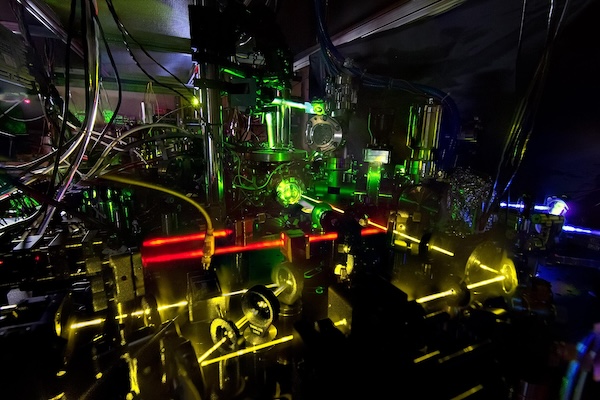Atomic Clocks
An atomic clock is a highly precise timekeeping device that uses the vibrations of atoms to measure time with exceptional accuracy. Atomic clocks are the standard for international time distribution services and are crucial for various scientific and technological applications, from global navigation systems to telecommunications.

By Credit: N. Phillips/NIST - NIST Debuts Dual Atomic Clock
How Do Atomic Clocks Work?
Atomic clocks operate based on the principles of quantum mechanics, specifically the consistent vibration frequencies of atoms. The most commonly used atoms in atomic clocks are cesium and rubidium. Here’s a brief overview of how they work:
-
Cesium Atomic Clocks are the most accurate and widely used atomic clocks. When exposed to microwaves at a specific frequency, a cesium atom's electrons transition between two energy states (9,192,631,770 Hz for cesium-133). This frequency defines the length of one second in the International System of Units (SI).
-
Rubidium Atomic Clocks: Rubidium clocks are less accurate than cesium clocks but are more compact and less expensive. They operate on similar principles, using the hyperfine transition of rubidium-87 atoms.
The core components of an atomic clock include a microwave oscillator, a cavity resonator, and a feedback control system. The microwave oscillator produces a fine-tuned signal to match the atoms' natural frequency. The cavity resonator exposes the atoms to the microwave signal, and the feedback control system ensures the oscillator remains locked to the correct frequency.
Historical Development
The development of atomic clocks began in the mid-20th century. The first accurate atomic clock, based on the ammonia molecule, was developed in 1949 by the National Bureau of Standards (now NIST). In 1955, Louis Essen and Jack Parry at the National Physical Laboratory in the UK built the first practical cesium atomic clock, significantly improving timekeeping accuracy.
Applications of Atomic Clocks
Atomic clocks have numerous critical applications, including:
-
Global Navigation Satellite Systems (GNSS): Systems like GPS, GLONASS, and Galileo rely on atomic clocks for precise timing, essential for accurate positioning and navigation. The timing data from satellites’ onboard atomic clocks allow receivers to calculate their position within meters.
-
Telecommunications: High-precision timekeeping is crucial for synchronizing data transmission across vast networks. Atomic clocks ensure data packets are transmitted and received in sync, reducing errors and improving efficiency.
-
Scientific Research: Atomic clocks are essential for experiments in fundamental physics, such as testing the constancy of physical constants and studying relativistic effects. They also support research in geophysics by providing precise measurements of Earth's gravitational field.
-
Financial Transactions: High-frequency trading and other financial operations depend on precise time stamps provided by atomic clocks to ensure accurate and fair trading.
-
International Timekeeping: Atomic clocks are the backbone of Coordinated Universal Time (UTC), the global time standard. National laboratories worldwide operate atomic clocks to contribute to the International Atomic Time (TAI), which forms the basis of UTC.
Advances in Atomic Clocks
Research in atomic clock technology continues to push the boundaries of precision and stability. Recent advancements include:
-
Optical Lattice Clocks: These clocks use lasers to trap atoms in an optical lattice and measure the vibrations of atoms such as strontium or ytterbium. Optical lattice clocks have achieved unprecedented accuracy, surpassing cesium atomic clocks.
-
Quantum Logic Clocks: Utilizing quantum entanglement and logic operations, these clocks offer potential improvements in accuracy and stability, paving the way for new scientific discoveries and technological innovations.
Future of Atomic Clocks
The future of atomic clocks holds exciting possibilities, including:
-
Improved Global Navigation Systems: Enhanced accuracy in atomic clocks will lead to even more precise positioning systems, benefiting transportation, logistics, and autonomous vehicles.
-
Space Exploration: Ultra-precise atomic clocks will be crucial in deep space navigation and communication, enabling more ambitious space missions.
-
Fundamental Science: As atomic clocks become more accurate, they will enable new tests of fundamental physical theories and constants, potentially leading to groundbreaking discoveries.
Conclusion
Atomic clocks represent the pinnacle of precision in timekeeping, providing the backbone for many critical systems in our modern world. From enabling accurate navigation to supporting high-speed communications and scientific research, their importance cannot be overstated. As technology advances, atomic clocks will continue to evolve, offering even greater accuracy and unlocking new possibilities for innovation.
For more detailed information on atomic clocks and to explore our comprehensive database of time data for nearly every location in the world, please use our search function or contact our support team.
If you have further questions or need assistance, please visit our Contact Us page. We are here to help and look forward to hearing from you!
